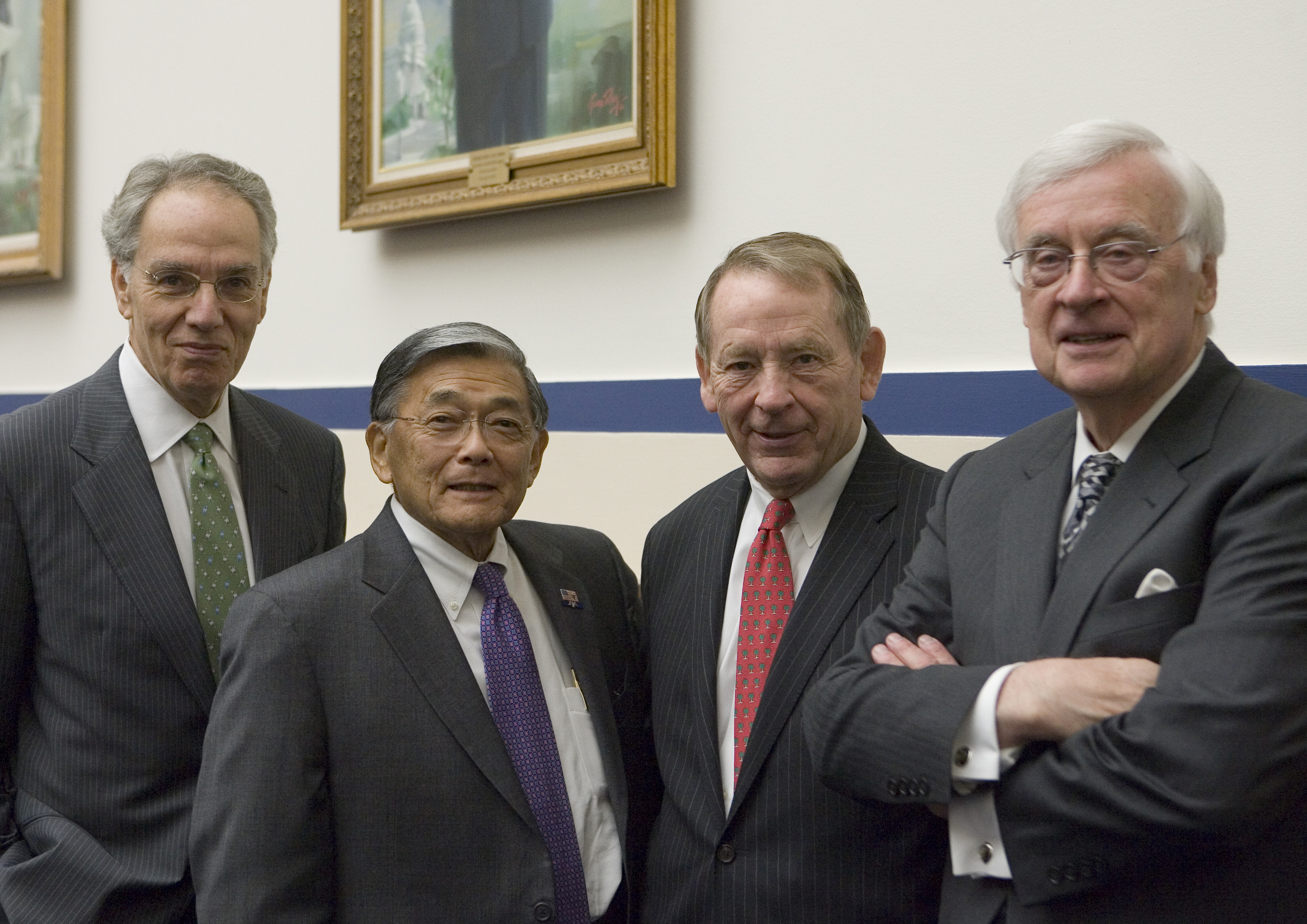October 4, 2010 — The University of Virginia's Miller Center of Public Affairs, working with former U.S. transportation secretaries Norman Mineta and Samuel Skinner, released a report Monday outlining 10 recommendations to fix the nation's overburdened transportation system, which is so central to U.S. economic prosperity.
Mineta, Skinner and Miller Center director Gerald L. Baliles held a news conference on Capitol Hill to present "Well Within Reach: America's New Transportation Agenda" to policymakers and media.
The report can be read online here.
The report is based on the David R. Goode National Transportation Policy Conference, which was held at the Miller Center and attended by more than 80 experts representing a wide array of transportation interests. They included current and former Transportation Department officials, national and state policymakers and community planners, as well as representatives from trucking, rail, aviation and business associations. Mineta and Skinner co-chaired the conference.
"Our aim was to issue a report that should be relied upon by future leaders and furnish them recommendations for reform that are both essential and achievable to ensure that we make the change necessary to ensure a strong economy for future generations," Mineta and Skinner said in the report.
Baliles added that federal and transportation programs suffer from the absence of steady, adequate funding and consistent, logical planning.
"Existing structures fall into disrepair, plans for new construction fail to adequately address the problems that they intend to fix, interconnectedness between various modes of transportation is not optimized, and millions of hours of productivity are lost and billions of tons of gasoline burned as citizens wait at a standstill. We are a nation in need of fresh strategic thinking," Baliles said.
The report outlines 10 recommendations:
• Stop the bleeding. Congress must address the immediate crisis in transportation funding.
• Beyond the gas tax. Future funding mechanisms should not depend primarily on fossil-fuel consumption, which the government is actively seeking to discourage through a number of other policies, to keep up with transportation investment needs.
• Jobs for the future, not just for today. Future stimulus spending should be directed to those transportation projects that will deliver the greatest returns in terms of future U.S. competitiveness, economic growth and jobs.
• Pass the power, please. Clarify federal decision-making power and enhance the decision-making power of states, localities and metropolitan-planning organizations.
• Adopt a capital budget. The federal government should adopt accounting methods that recognize expenditures on transportation infrastructure as investments and take into account future returns on those investments.
• Connect the dots. Adopt an integrated approach to transportation planning that includes freight and goods movement and stresses intermodal connectivity.
• Get Americans home in time for dinner. Find more effective ways of reducing urban congestion.
• It's all about leveraging. Encourage public-private partnerships while also improving oversight of such partnerships.
• Deliver transportation investments on time. Reform project planning, review and permitting processes to speed actual implementation.
• Build a foundation for informed policy. Better and more timely data are essential to measure progress toward defined goals and objectives and to improve the performance of the nation's transportation systems.
Mineta, Skinner and Miller Center director Gerald L. Baliles held a news conference on Capitol Hill to present "Well Within Reach: America's New Transportation Agenda" to policymakers and media.
The report can be read online here.
The report is based on the David R. Goode National Transportation Policy Conference, which was held at the Miller Center and attended by more than 80 experts representing a wide array of transportation interests. They included current and former Transportation Department officials, national and state policymakers and community planners, as well as representatives from trucking, rail, aviation and business associations. Mineta and Skinner co-chaired the conference.
"Our aim was to issue a report that should be relied upon by future leaders and furnish them recommendations for reform that are both essential and achievable to ensure that we make the change necessary to ensure a strong economy for future generations," Mineta and Skinner said in the report.
Baliles added that federal and transportation programs suffer from the absence of steady, adequate funding and consistent, logical planning.
"Existing structures fall into disrepair, plans for new construction fail to adequately address the problems that they intend to fix, interconnectedness between various modes of transportation is not optimized, and millions of hours of productivity are lost and billions of tons of gasoline burned as citizens wait at a standstill. We are a nation in need of fresh strategic thinking," Baliles said.
The report outlines 10 recommendations:
• Stop the bleeding. Congress must address the immediate crisis in transportation funding.
• Beyond the gas tax. Future funding mechanisms should not depend primarily on fossil-fuel consumption, which the government is actively seeking to discourage through a number of other policies, to keep up with transportation investment needs.
• Jobs for the future, not just for today. Future stimulus spending should be directed to those transportation projects that will deliver the greatest returns in terms of future U.S. competitiveness, economic growth and jobs.
• Pass the power, please. Clarify federal decision-making power and enhance the decision-making power of states, localities and metropolitan-planning organizations.
• Adopt a capital budget. The federal government should adopt accounting methods that recognize expenditures on transportation infrastructure as investments and take into account future returns on those investments.
• Connect the dots. Adopt an integrated approach to transportation planning that includes freight and goods movement and stresses intermodal connectivity.
• Get Americans home in time for dinner. Find more effective ways of reducing urban congestion.
• It's all about leveraging. Encourage public-private partnerships while also improving oversight of such partnerships.
• Deliver transportation investments on time. Reform project planning, review and permitting processes to speed actual implementation.
• Build a foundation for informed policy. Better and more timely data are essential to measure progress toward defined goals and objectives and to improve the performance of the nation's transportation systems.
Media Contact
Article Information
October 4, 2010
/content/miller-center-ex-dot-secretaries-outline-fixes-us-transportation-system

